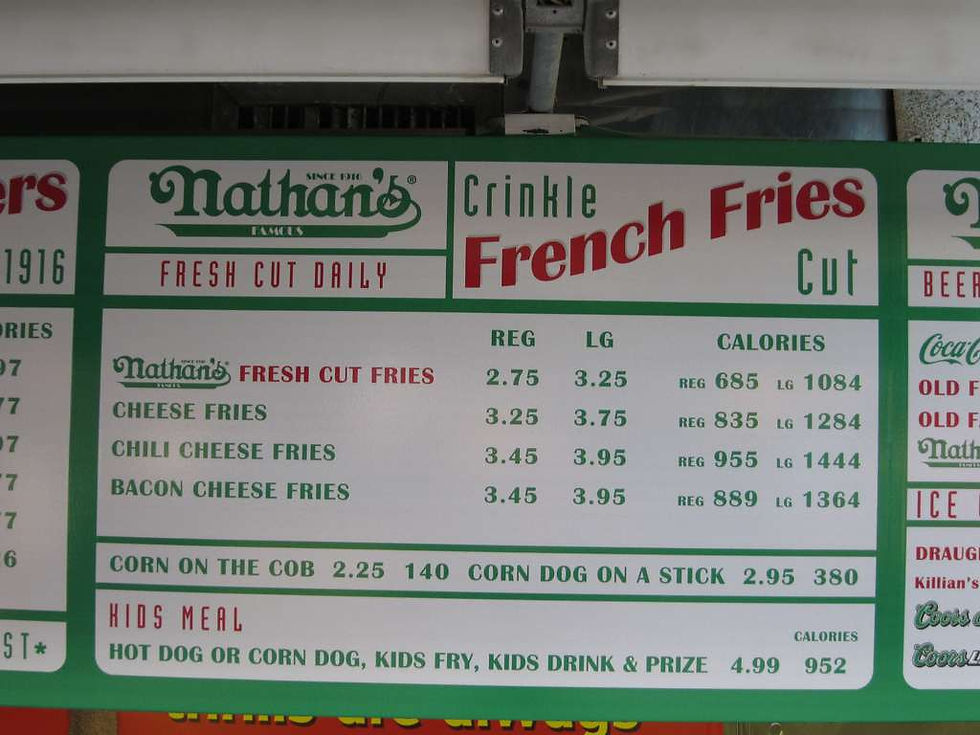'Common Sense' Means Repealing the FDA's Menu-Labeling Mandate
- OurStudio

- Feb 20, 2016
- 3 min read

Credit: akasped / photo on flickr
Last week, the U.S. House of Representatives voted 266-144 in favor of the Common Sense Nutrition Disclosure Act of 2015. The bill now heads to the Senate for consideration.
If passed, the bill would amend a host of menu-labeling rules that were adopted by the Food and Drug Administration (FDA) under the Affordable Care Act (more commonly known as Obamacare).
While the Obamacare labeling mandate had been envisioned to apply to chain restaurants with 20 or more locations in the United States, including McDonald's, TGI Fridays, and Ruth's Chris Steakhouse, the FDA rules cast a far wider net. Those rules the FDA drafted cover seemingly every sort of chain that serves food.
"That includes prepared foods at grocery and convenience stores and in movie theaters, bakeries, coffee shops, pizza delivery stores, and amusement parks," the Associated Press notes.
The Common Sense Nutrition Disclosure Act would provide pizza chains in particular, which have pushed for the bill's passage for years, with a variety of new ways to comply with the law and strengthen limitations on liability for all restaurants covered by the law.
Besides pizza chains, some grocers support the measure. The National Grocers Association, for example, praised the House for passing the bill. A coalition of public-health activists and academics, on the other hand, has urged Congress to reject the bill, asking lawmakers "to support consumer choice and American[s'] health" by voting down the Common Sense Nutrition Disclosure Act.
The Obama administration, which supported the original menu-labeling provisions, hasn't said whether it would veto the current bill.
Critics of mandatory calorie labeling, including me, have argued for years that menu-labeling provisions, including those adopted by the FDA, are rigid, overly inclusive, overly burdensome, pointless, and counterproductive.
For example, research indicates mandatory menu labeling may not just be ineffective, but also counterproductive. Studies have found that customers who view calorie counts on restaurant menus have been shown to eat more calories, rather than fewer. Contradictory studies that have touted menu labeling tend to be filled with qualifiers, along the lines of a small percentage of the small percentage of consumers who self-reported that they noticed calorie information on restaurant menus reduced their calorie intake by a small amount.
Perhaps most importantly, enforcing the rules will be tricky. The FDA currently does not inspect restaurants. It would be absurd for an agency that claims both its budget and its inspectors are strapped to suddenly take on the visual inspection of tens of thousands of restaurant menus around the country. The FDA might seek to hire local inspectors to do the job—by paying state and local health departments to do the work for them, including in states and cities that adopt legislation that mirrors federal law, as this writer suggests.
But in states where legislatures are hostile to the Affordable Care Act generally or to its menu-labeling provisions specifically, I suspect lawmakers are more likely to pass legislation to block such enforcement than they are to pass legislation that would support the federal law.
All this makes the menu-labeling provisions of the ACA sticky at best, and likely ripe for a court challenge.
It's perhaps for this latter reason that the FDA announced this past summer it would not begin enforcing the ACA menu-labeling rules until December 2016. That gives supporters of the Common Sense Nutrition Disclosure Act of 2015 a window in which to tweak the law.
Better still, based on all of the problems inherent with mandatory menu labeling, would be action in Congress to repeal the law. But that's unlikely.
"We are not debating the merits of calorie counts in restaurants," said Rep. Cathy McMorris Rodgers (R-Wash.), who introduced the Common Sense Nutrition Disclosure Act, in a recent op-ed in The Hill. "We are debating if this specific, 400-page rule is workable."
It's unworkable. But it's too bad that discussing the merits of mandatory menu labeling appear to be off the table. As law, regulation, and policy, menu labeling is wildly unsettled. It's one that's very much in need of thoughtful debate.




Comments